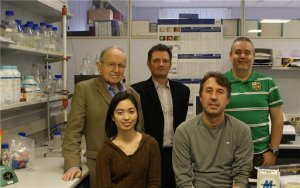Dec 15 2009
Chemists and biologists from the University of Bath have developed a new technique that could be used to diagnose and develop treatments for age-related conditions like Alzheimer's disease, diabetes and cancer.
 The project was a cross-departmental collaboration between biologists and chemists at the University of Bath, led by Dr Jean van den Elsen (front right) and Dr Tony James (back right)
The project was a cross-departmental collaboration between biologists and chemists at the University of Bath, led by Dr Jean van den Elsen (front right) and Dr Tony James (back right)
In these diseases, proteins in the body react with sugars in a process called glycation. This modifies the protein’s function and can trigger complications such as inflammation and premature aging.
The team at Bath, led by Dr Jean van den Elsen and Dr Tony James, has developed a technique that can detect glycated proteins and could in the future be used for diagnosing a whole range of diseases in patients.
They used a technique called gel electrophoresis, where samples are put into a thin gel layer and an electric current is applied. The gel acts like a molecular sieve, sorting proteins from the samples according to their size and shape, allowing scientists to identify whether specific proteins are present in the blood.
For this study, the researchers have patented a new type of gel electrophoresis, which uses boronic acid to distinguish between the glycated and unmodified proteins.
Dr Tony James from the University’s Department of Chemistry explained: "Not all sugars are ‘bad’ - in fact many proteins contain beneficial ‘good’ sugar units.
“However, some sugars can be ‘bad’ and cause complications in diseases such as Alzheimer’s and diabetes.
Dr Jean van den Elsen, from the University’s Department of Biology & Biochemistry, said: "Our method specifically recognises these ‘bad’ sugars in the presence of the ‘good’ sugars and as such is an excellent diagnostic tool.”
PhD student Marta Pereira Morais added: “We believe our method will also aid the development of new drug based therapies for these diseases."
Whilst the technique has only been assessed in the lab at present, the researchers say it has the potential to be developed into a test for these conditions in patients.
Dr James added: “Currently there is no blood test for Alzheimer’s disease.
“If we can develop this technique into a test, doctors could potentially diagnose patients at an early stage before their symptoms show up in a brain scan.”
The method could also be used to diagnose diabetes, which also leads to elevated levels of glycated proteins in the blood.
Dr van den Elsen said: “Whilst there are other methods of detecting diabetes, this will be an excellent way to measure the level of this glycation damage.”
The importance of the technique has been recognised by publication in the scientific journal Proteomics and by the University which has patented the method.
The project was funded from a number of sources including the University’s Enterprise Development Fund (EDF), the Biotechnology & Biologcial Sciences Research Council and the Royal Society.
The team is now looking for industrial collaborators to help develop the technique further with the aid of the University’s technology transfer centre, Bath Ventures.